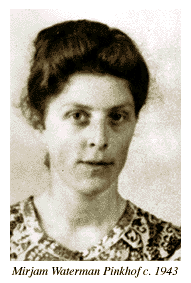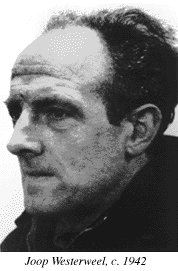Mirjam Pinkhof Tells Her Story
 Born in Holland in 1916, to a Jewish family of comfortable means, Mirjam Waterman became a school teacher at the age of twenty-two. Soon after, she found herself deeply involved with the
Youth Aliyah
movement, an offshoot of the
Zionist movement.
Born in Holland in 1916, to a Jewish family of comfortable means, Mirjam Waterman became a school teacher at the age of twenty-two. Soon after, she found herself deeply involved with the
Youth Aliyah
movement, an offshoot of the
Zionist movement.
Youth Aliyah was organized in 1933, to save Jewish children from Nazi Germany and Austria by helping them emigrate to Palestine. After Kristallnacht, November 9, 1938, when many German Jews understood for the first time the seriousness of their situation, the number of parents turning for help to Youth Aliyah greatly increased.
Because the demand for Palestine immigration certificates soon exceeded their availability, Youth Aliyah brought thousands of the refugee children to "safe" European countries, especially Holland and Britain.
By the outbreak of World War Two in September 1939, Youth Aliyah had arranged for the immigration to Palestine of over five thousand German and Austrian Jewish children, and the safe transport of fifteen thousand others to as yet unoccupied European countries. The children called themselves Young Palestine Pioneers.
Mirjam Pinkhof: I grew up in an environment of very advanced liberal and humanistic ideas, but knowing nothing about Jewish subjects. We were a completely assimilated family.
My mother's family was Portuguese Jewish; her name was Lopes Cardozo. As a young woman she entered a utopian society for better living: the Frederik van Eeden Community, something like Walden in America. After her marriage she remained active in humanistic, anti-military and anti-fascist organizations.
My entire family was assimilated, except for my father, who came from the poor
Jewish quarter
in Amsterdam. He worked his way up in the world by leaving the unpromising conditions in Amsterdam, and moving to the countryside where he bought land to start a nursery for fruit trees and roses. But the times were not right for it. It was around the beginning of World War One, and there was a boom in the diamond trade, but problems in the nursery business. So for the rest of his life my father earned his living in the diamond trade, while the farm and fruit trees became his hobby. He always stayed in contact with the Jewish community in Amsterdam, and with many of the Jewish refugees coming to Holland in those days from Russia and Poland. He was a very "Jewish" man.
But my father was also a vegetarian, and an active participant in many socialistic activities, which is how he met my mother. This is why we five children grew up in Loosdrecht--far from Jewish life--in an enormous garden, surrounded by people who were trying to build a better world.
Teaching: There was a school in Bilthoven called the Werkplaats Kinder Gemeenschap (Children's Community Workshop). The founder was Kees Boeke, who was well known at the time in educational circles all over western Europe for his progressive ideas. Boeke was a Quaker, and his school was notable for its idealistic principles.
 It was run somewhat like a kibbutz, forming its own community, and growing its own food. The people who taught there did so out of moral conviction and idealism, rather than to make money, because the school paid its staff very little. The head teacher was Joop Westerweel, who later became famous in Holland for his resistance against the Germans. I was a teacher at this school.
It was run somewhat like a kibbutz, forming its own community, and growing its own food. The people who taught there did so out of moral conviction and idealism, rather than to make money, because the school paid its staff very little. The head teacher was Joop Westerweel, who later became famous in Holland for his resistance against the Germans. I was a teacher at this school.
One of the principles of the school was that the pupils could have a say about our teaching and how we ran the school's daily life. In this spirit, a student stood up one day in 1939, and told us that when he came to school in the mornings he passed a house where he saw teenagers hanging around, some up in the trees--all of them very bored. That day he got off his bicycle to talk with them. They told him they were Jewish refugees from Germany who had been brought to Holland by the Youth Aliyah movement. They had a nice place to live, but they had no books, no school, and nothing much to do. Our student asked us, "Could we possibly arrange to bring these children to the Werkplaats for school?"
Joop Westerweel, said, "Of course! They must come!" Kees Boeke rented a special classroom building for these twenty-five Jewish children, and pretty soon they were coming to our school every morning, returning to their Youth Aliyah house only late in the afternoon.
Because of my Jewish origins, the school appointed me to teach this group. Out of this contact Joop Westerweel and I became very good friends. I learned at first hand about his enthusiasm for helping the Jewish children, and his anti-Nazi, anti-German feelings. He was one hundred percent on the Jewish side, wanting to enrich the lives of these children, and do everything possible to help them. We both worked extremely hard, trying to show that we wouldn't collaborate with the Germans and that we were against everything the Nazis represented.
 Born in Holland in 1916, to a Jewish family of comfortable means, Mirjam Waterman became a school teacher at the age of twenty-two. Soon after, she found herself deeply involved with the
Youth Aliyah
movement, an offshoot of the
Zionist movement.
Born in Holland in 1916, to a Jewish family of comfortable means, Mirjam Waterman became a school teacher at the age of twenty-two. Soon after, she found herself deeply involved with the
Youth Aliyah
movement, an offshoot of the
Zionist movement.
 It was run somewhat like a kibbutz, forming its own community, and growing its own food. The people who taught there did so out of moral conviction and idealism, rather than to make money, because the school paid its staff very little. The head teacher was Joop Westerweel, who later became famous in Holland for his resistance against the Germans. I was a teacher at this school.
It was run somewhat like a kibbutz, forming its own community, and growing its own food. The people who taught there did so out of moral conviction and idealism, rather than to make money, because the school paid its staff very little. The head teacher was Joop Westerweel, who later became famous in Holland for his resistance against the Germans. I was a teacher at this school.